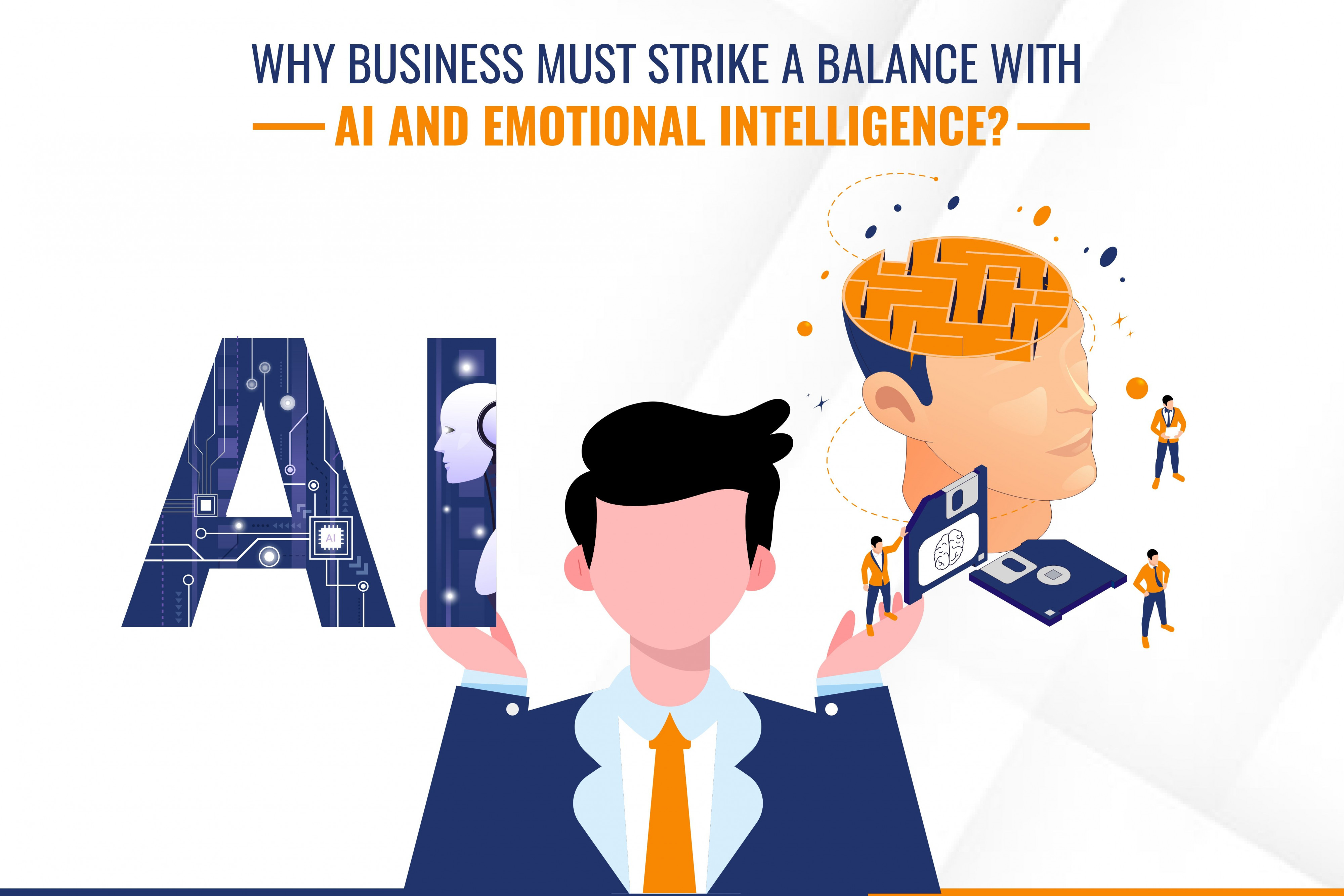
Why Business Must Strike a Balance With AI and Emotional Intelligence?
In the present-day world of evolving technologies, the integration of artificial intelligence (AI) has become nearly ubiquitous. AI has undoubtedly revolutionized many aspects of business, from streamlining operations to enhancing customer experiences. However, while AI offers numerous advantages, it is essential for businesses to strike a delicate balance between AI and emotional intelligence (EI) to ensure long-term success and sustainability. So let’s delve into the reasons why businesses must harmonize AI and EI to thrive in the modern world.
Striking A Balance Between AI and Emotional Intelligence
The Power of AI in Business
Artificial intelligence has emerged as a transformative force in the business world. It has the capacity to process vast amounts of data at unparalleled speeds, enabling businesses to make data-driven decisions with precision. AI-powered tools and technologies, such as chatbots, data analytics, and automation systems, have the potential to revolutionize various facets of business operations, including customer service, supply chain management, and marketing.
One of the significant advantages of AI in this Technical Transformation era lies in its ability to eliminate human errors and biases. Algorithms can analyze data objectively, free from the influence of emotions or preconceived notions. This objectivity allows for more accurate predictions and insights, driving better decision-making.
Emotional Intelligence: The Human Edge
While AI undoubtedly excels in tasks that require logic and data analysis, it falls short in areas that necessitate empathy, understanding, and emotional connection. This is where emotional intelligence, the ability to recognize and manage one's own emotions and understand and influence the emotions of others, becomes indispensable.
In a business context, emotional intelligence is crucial for building and nurturing relationships with customers, employees, and partners. Leaders with high EI can inspire and motivate their teams, resolve conflicts, and foster a positive workplace culture. Likewise, salespeople with a keen sense of EI can connect with customers on a personal level, leading to increased customer loyalty and higher sales.
The Importance of Striking a Balance
Enhanced Customer Experiences
In today's customer-centric business landscape, providing exceptional experiences is paramount. While AI can automate processes and provide quick responses to customer queries, it often lacks the personal touch that human interactions can offer. Striking a balance between AI and EI allows businesses to leverage technology and their Technical Learning for efficiency while ensuring that customers receive empathetic and personalized support when needed.
For instance, AI-driven chatbots can handle routine inquiries swiftly, freeing up human customer service agents to focus on more complex issues that require emotional intelligence and problem-solving skills. This combination ensures efficient customer support without sacrificing the human touch.
Employee Well-being and Engagement
The well-being and engagement of employees are critical factors in a company's success. AI can play a role in optimizing workflows and increasing productivity, but it cannot replace the emotional connection that employees seek from their workplace. Leaders who demonstrate emotional intelligence can create a positive work environment, fostering employee loyalty, satisfaction, and motivation.
When employees feel understood and valued, they are more likely to be engaged and dedicated to their work. AI can assist in HR processes, such as recruitment and performance evaluations, but it is the human touch that ensures employees feel heard and supported, contributing to a healthier work culture, no matter how intense the Technical Transformation is or will be.
Innovation and Creativity
Innovation is a driving force behind business growth and competitiveness. AI can help analyze vast datasets and generate insights, but it cannot replicate the creative thinking and problem-solving abilities of humans. Emotional intelligence encourages collaboration, open communication, and a culture of creativity, all of which are essential for innovation.
Businesses that balance AI with EI foster an environment where employees feel encouraged to express their ideas and take calculated risks. This blend of technological efficiency and human creativity can lead to groundbreaking innovations and a competitive edge in the market.
Ethical Considerations
AI, while powerful, is not immune to biases that can be ingrained in its algorithms. Without human oversight and ethical considerations, AI systems can inadvertently perpetuate discrimination and inequality. Emotional intelligence comes into play in ensuring that AI is used responsibly and ethically.
Business leaders with high EI are more likely to make ethical decisions regarding AI deployment, considering the broader societal impact and potential biases. They can also engage with stakeholders, including employees and customers, to address concerns and gather feedback, ensuring that AI aligns with ethical standards.
Adaptability and Resilience
The business landscape is continually evolving, with unforeseen challenges and disruptions. AI can help businesses analyze data to predict trends and adapt quickly, but it is emotional intelligence that equips leaders and teams with the resilience needed to navigate uncertainty.
Leaders with high EI can provide stability during crises, showing empathy and understanding towards their teams. They can also effectively manage change by communicating with transparency and guiding employees through transitions. This emotional support, combined with AI's analytical capabilities and Technical Learning, enables businesses to weather storms and emerge stronger.
Final Words
In the era of AI-driven business, it is vital for organizations to strike a balance between artificial intelligence and emotional intelligence. While AI brings unparalleled efficiency and data-driven insights, emotional intelligence fosters authentic human connections, ethical decision-making, and innovation. When used in harmony, AI and EI create a powerful synergy that drives business success, enhances customer experiences, and cultivates a resilient and engaged workforce. In a rapidly changing world, finding this equilibrium is not just an option but an imperative for sustainable growth and prosperity.
